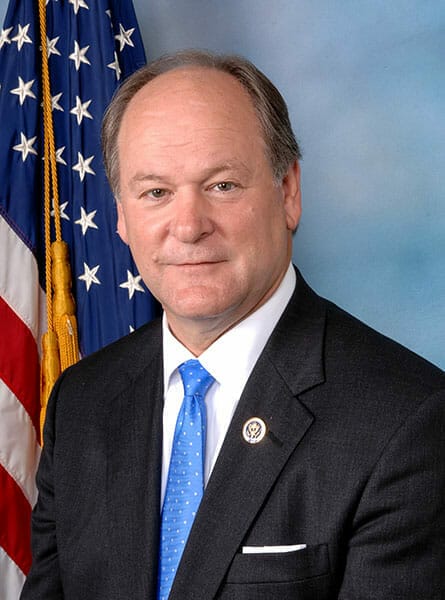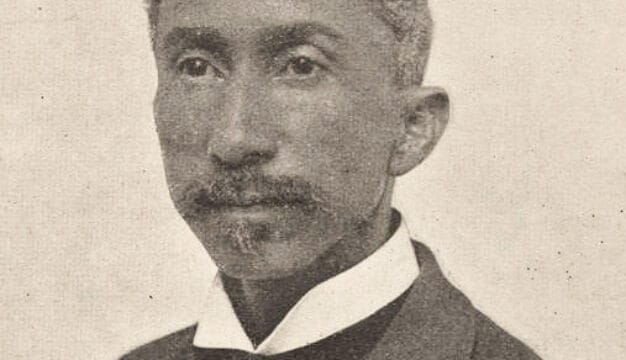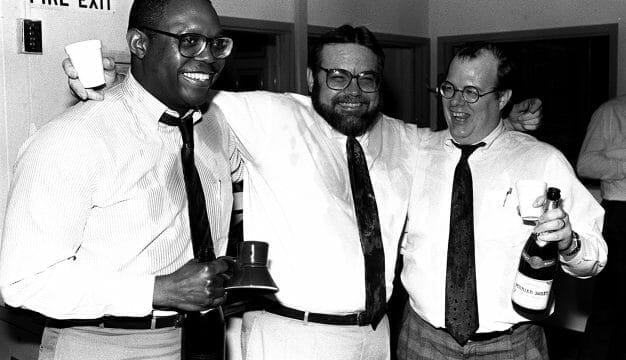Bobby Neal Bright Sr.
 Bobby Bright
Bobby Neal Bright Sr. (1952- ) is a politician who served three terms as mayor of Montgomery, Montgomery County, from 1999 to 2008. His tenure saw much economic development in the city, including construction of the Montgomery Riverfront complex and Riverwalk Stadium. He also represented Alabama’s Second Congressional District from 2009 to 2011. Although a Democrat, he was generally aligned with the more conservative wing of the party.
Bobby Bright
Bobby Neal Bright Sr. (1952- ) is a politician who served three terms as mayor of Montgomery, Montgomery County, from 1999 to 2008. His tenure saw much economic development in the city, including construction of the Montgomery Riverfront complex and Riverwalk Stadium. He also represented Alabama’s Second Congressional District from 2009 to 2011. Although a Democrat, he was generally aligned with the more conservative wing of the party.
Bright was born on July 21, 1952, in Midland City, Dale County, to John and Rosa Bell Bright; he was the 13th of 14 children. John Bright was a cotton sharecropper, and the Bright children grew up in impoverished circumstances. Bright graduated from Carroll High School in Ozark, Dale County, and later attended Enterprise State Junior College (now Enterprise State Community College). His father died while he was in junior college, and he was forced to take a series of jobs, including digging ditches and working as a roofer, a guard, a hotel porter, and a teacher, to help support his family.
In 1975, Bright graduated from Auburn University in Auburn, Lee County, with a bachelor’s degree in political science. Two years later, he earned a master’s degree in criminal justice at the University of Troy (present-day Troy University) in Troy, Pike County, and later worked as a prison guard. In 1982, Bright received a law degree from Faulkner University‘s Thomas Goode Jones School of Law, in Montgomery County, and opened a law practice. He married Lynn Clardy, a Democratic district judge, with whom he has three children.
Bright ran for mayor of the city of Montgomery in 1999 and upended longtime incumbent Emory Folmar, a Republican who had served since 1977. Bright at that time did not have a party affiliation. Four years later, he won a second term, decisively defeating Scott Simmons, and won a third term against Simmons in 2007. While mayor, Bright helped develop a plan to revitalize Montgomery’s recreational and commercial economy along the Alabama River front. He worked with the Montgomery Riverfront Development Foundation, the late city planning director Ken Groves, and private investors to secure both public and private funding for the Riverwalk entertainment and recreation area and Riverwalk Stadium. Bright also aggressively promoted bringing the Montgomery Biscuits, a Class AA minor league baseball team based in Orlando, Florida, back to Montgomery in 2004 after a 24-year absence. In addition, the Montgomery Civic Center was remodeled into the Renaissance Montgomery Hotel and Spa at the Convention Center and the Montgomery Performing Arts Centre was added to the project. Meanwhile, the downtown core of the city began to be revitalized, with the addition of new housing. These redevelopment projects are widely considered to have been very successful. Bright also was very supportive of the Hyundai Motor Manufacturing Alabama plant that began production in 2005 and straddles the city’s southern boundary.
Politically, Bright developed a consistently conservative platform, but never declared himself a Republican. On national issues, Bright opposed abortion and gay rights, championed gun rights, and even encouraged Montgomery residents to purchase firearms. He supported increased funding for the U.S. military and opposed higher taxes as well as illegal immigration. He endorsed former Arkansas governor Mike Huckabee for president during the Republican primary in early 2008. When Bright considered entering national politics, both the Democratic and Republican parties attempted to recruit him.
In 2008, Bright ran as a Democrat for the open seat of retiring Republican congressman Terry Everett, who had represented the Second Congressional District since 1993. (The district encompasses the Wiregrass region in southeast Alabama, several Black Belt counties, as well as the cities of Prattville, Greenville, Troy, Andalusia, Dothan, and Eufaula and much of Montgomery.) He narrowly prevailed over Jay Love Jr., a Republican member of the Alabama House of Representatives, winning 50.3 percent to 49.7 percent. Bright was the first Democrat elected to the seat since William Dickinson won the office in 1965. Montgomery County Commission chairman Todd Strange won a special election for mayor in March 2009.
Bright served one term, in the 111th Congress from 2009 to 2011. His voting record aligned with the Blue Dog Coalition of House Democrats, a caucus of the more conservative members of the party who endorsed Bright’s election bid. In February 2009, as the country was attempting to recover from the Great Recession, Bright was just one of seven congressional Democrats who voted against the American Recovery and Reinvestment Act, also known as the Omnibus Stimulus Package Bill. He voted against several employment discrimination measures, including the Lilly Ledbetter Fair Pay Act of 2009, which aimed to mandate equal pay for equal work regardless of gender and was named for the Alabama native who was lead plaintiff in a 2007 Supreme Court decision. He, along with Alabama Democrat Artur Davis, voted against the Affordable Care Act (termed Obamacare in the media) but Bright refused to support its repeal. Despite his high-profile votes against his own party, Bright voted with the Democrats 73 percent of the time. Some political analysts predicted Bright would join Parker Griffith in defecting to the Republican Party given his conservative stances on fiscal, social, and defense issues, but he chose not to do so. In general, legislation Bright sponsored focused on local economic growth and fiscal responsibility, but none became law.
In the 2010 election, Bright was challenged by Montgomery city councilwoman Republican Martha Roby. Her main campaign theme was Bright’s vote for House Speaker Nancy Pelosi on his first day in office; a vote he claimed to have regretted two years later. Though he announced he would not support Pelosi again, Bright lost to Roby in the 2010 election 51.1 percent to 48.9 percent. Bright considered running in 2014 as a Republican for an open State Senate seat previously held by Bryan Taylor of Prattville, Autauga County, but did not enter the race. In 2018, Bright ran as a Republican and a supporter of Pres. Donald Trump in a bid to retake his old congressional seat. He lost to Roby in the July Republican primary run off by a large margin. Bright and his wife own Jackson Lake Island, where the fictional town of Spectre, Alabama, was constructed for the 2003 Tim Burton film Big Fish. The island functions as a recreational spot for fishing, canoeing, and camping and attracts tourists interested in the film.



